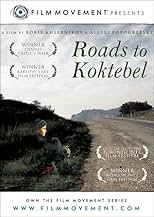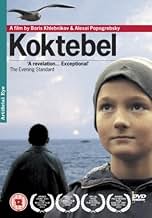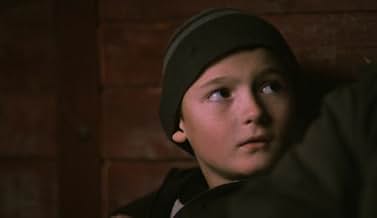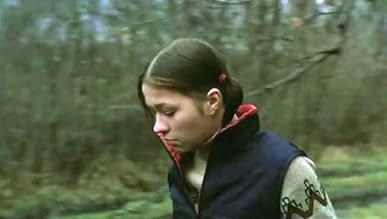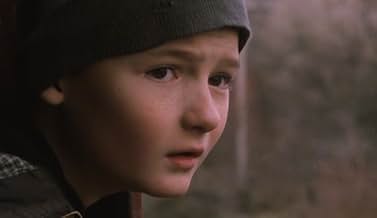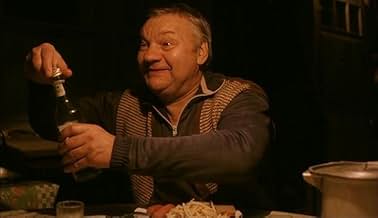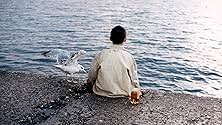Ajouter une intrigue dans votre langueA widowed aeronautics engineer, who has lost his job, travels with his son hopping freight trains from Moscow to Koktebel, a town by the Black Sea, to start a new life with the father's sist... Tout lireA widowed aeronautics engineer, who has lost his job, travels with his son hopping freight trains from Moscow to Koktebel, a town by the Black Sea, to start a new life with the father's sister. After they are stopped by a train guard, they continue their travel on foot. The fathe... Tout lireA widowed aeronautics engineer, who has lost his job, travels with his son hopping freight trains from Moscow to Koktebel, a town by the Black Sea, to start a new life with the father's sister. After they are stopped by a train guard, they continue their travel on foot. The father battles against his alcohol addiction and the son is fascinated with the idea of flight.... Tout lire
- Réalisation
- Scénario
- Casting principal
- Récompenses
- 5 victoires et 11 nominations au total
Avis à la une
Someone mentioned the landscapes are bleak... The film is isomorphic to its landscapes. Bleak and lovely at the same time. Little bit depressing for those who choose to stay at a distance, to look at (film or landscapes) as at exhibits. For those who step in, it becomes precious in its touching ugliness. As you enter, ugliness is redefined. We are able to adore and love what we thought ugly before when we lived in the world bombarded by artificially selected beauty. We appreciate the naturality, the simple yet awkward reality of landscapes, of characters and of situations. The directing and actors are both excellent and succeed to achieve this reality so difficult to balance on screen!
There isn't more talk than necessary, more expression of emotions or velocity of thought than a real living person would allow - not any of the tricks directors have to use to keep us interested. Yet the film is not boring. Because we can feel and understand the characters on screen as fully as we can a human being next to us! We can recognize little parts from the happening in the memories of our own life.
Memories otherwise we'd never pay attention to.
Here are a few of the most memorable pictures which stayed with me long after watching the film: 1) A red and white parasol on an empty pebble beach at night, twitching like a living thing, waves breaking, perfectly black water; 2) A close-up of a girl's hair roots, a cash register and a cashier's voice audible from beyond; 3) A solitary wooden toilet shack outside a wood with a cheap stereo hanging from a neighbouring tree branch, little red lights on the speakers flashing like eyes as the camera approaches, the music gets louder; 4) Objects flashing into view for split seconds between stretches of darkness, as seen through the lens of an old camera.
Between the geometric shapes of the opening and closing shots (a tunnel in a hill and a bird's-eye view of a landing pier respectively), almost every scene provides an earthy, harmonious, visual gem, each worthy of admiration in its own right.
The clearest recurring theme in the film is flying. One of the first lines is the father's weary joke "we'll go by plane" (wrongly subtitled as "we'll fly") he's a former plane engineer. Fed on his talk of butterflies and birds and hang-gliders, his son has his own dreams of flight, which recur as an albatross in an illustrated book, as rusty sheets of metal gliding from a roof, as sheets of paper being launched from a hilltop (the motionless camera leaves us to wonder how far the last one does actually fly), with the boy's gift of being able to visualise a landscape from a great height (filmmakers can have poetic licence too), and with the film's closing bird's-eye shot. To me this flying metaphor can be extended beyond it's obvious application to the boy (living in poverty but abounding in curiosity, imagination, and daydreams), to the lowly cast of the film, left behind by the new Russia (and Ukraine), and to the economic backwaters they live in. Whether or not the characters themselves dream of flying, the filmmaker, dwelling lovingly on the things that surround them (apple trees, a storm, a washing line) elevates them to a work of art, and does their dreaming for them.
I couldn't fail to deeply admire this film, but I don't expect anyone to share my very personal take on it in its measured, pensive, quiet voice, Koktabel shows us the former USSR from an angle which brings out those same qualities that impressed me in my first experiences of the place. Not the glitz and kitsch and squalour of its largest cities, but its vast expanses (expressed in the film through fields, roads, and rail tracks), the uniqueness of Russian minutiae (a soviet-manufactured metal tub, an old-fashioned box of cigarettes, standard cheap wallpaper and clock in a house, the bustle in a tourist market), and above all, vibrancy amidst decay.
The main theme (what the movie is all about) is the terrible struggles and situations an alcoholic struggles with. One of the best scenes occurs when he runs out of vodka---so completely authentic.
It is an intelligent movie done by a director who makes visual points with just the right amount of emphasis to tie things together...look for the ladders and the umbrellas. The idea of flight... it is subtle and carefully thought out.
It is the story of an alcoholic aeronautical engineer and his 11 year old son who are penniless and trying to get to Crimea to live with a relative ---but there are so many levels...the place they are going to is a famous aeronautical gliding site. The father's career/life seems to have never taken off... you can read so many things into this movie.
It is the best one I have seen for a long long time.
Le saviez-vous
- ConnexionsReferenced in Radio Dolin: A New Cinema from Russia. The Best and the Worst (2025)
Meilleurs choix
Détails
Box-office
- Montant brut mondial
- 225 642 $US
- Durée1 heure 40 minutes
- Couleur
- Rapport de forme
- 1.85 : 1
Contribuer à cette page


